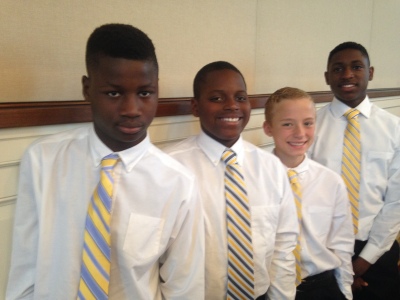Like I said in my first post, Black lives matter.
If you haven’t read it, you can read it here.
Here’s my story about how I came to believe that, which in all honesty shouldn’t be that hard for us to say. You see, I have 3 African-American sons. One is from inner-city Atlanta, one is from Mali, Western-Africa, and one if from Liberia, also in Western-Africa.

Several years ago at an adoption conference, I heard a black pastor talking to mainly white parents on the issues they needed to be aware of while raising their adopted children of color. This was my first exposure to the idea that I need to be aware of how I was raising my boys. I was made aware that I may have some blind spots. I am white and am raising black teenage boys. I don’t see them as black teenage boys. That’s good and that’s also bad in a way. I see them as my sons. I know their character. I know that they are loving, kind, and respectful. This is a good thing. I am colorblind in a sense.
And in a negative way I am colorblind. Let me explain. I believe that it was sometime after the Michael Brown shooting, I was reading some articles by some black pastors and leaders about lessons that their parents taught them growing up. Things they were taught like, “As a black adolescent, never run in a public park with something in your hand. People will assume you have stolen something.” I had never thought about this and my experience told me that this wasn’t something to think about. I read articles like this that describe “The Talk” that many black males receive as they are growing up.
“The Talk, not about the birds and the bees, but about the dangers of being black and male in a country with a policing culture that sees the combination as threatening, if not inherently criminal.”
I realized that this was not part of my parenting reality. Before, I couldn’t imagine having to have “The Talk” with my boys, but now I realized that this was something that had to become a reality to me. You see, if I saw my black sons running through the park I would instinctively know that they aren’t doing anything wrong. I wouldn’t see thugs stealing something and getting away with some mischief. I would see my boys. I would be colorblind. What would the world see though? How would they interpret the same actions? I think nothing of my boys wearing hoodies. But is that the same for parent’s of color raising boys in this culture?
Let me put it another way. It would be as if I did not care about what my teenage daughter wore to a party because all I see is “daddy’s little girl”. It would be naive of me to not think about modesty and her dress. Just because I only see “daddy’s little girl” doesn’t mean the teenage boy at the party will see the same thing. As much as I don’t like that thought, it is naive of me not to think through those situations. I may hope I live in a world where no matter what she wears she is seen for the character and beauty within, but I know that isn’t the case. So I teach those lessons to her about modesty. But I had been colorblind to the lessons my sons needed to know. Things that were apart of other black parent’s reality that had not been my own. I began to realize that my reality and experience was not the reality and experience of other parents. I now had skin in the game. My son’s skin. Their lives mattered.
Black Lives Matter.
But wearing modest clothes is one thing. My sons cannot, nor should not want, to change the color of their skin. So if they can’t change their skin, maybe it was my perceptions of the racial realities in this country that needed to change. And if I can change maybe others can change. This was eye opening to me. When I began to realize that my reality might not be fully reliable to understand the reality of another, I began to listen. I began to slowly understand. I don’t fully get it yet, but I want to say I am listening.
And that’s where it starts white Americans. Listen. Be quick to listen and slow to speak. Read without defending your positions. Listen to multiple accounts. Begin to recognize your blind spots.
Think on these words by Lecrae
“If you enslave and torture a people for 400 years, tell them they are free but torture them another 100 years, and then kind of give them rights begrudgingly 50 years ago, how can you expect zero systemic effects?
You can’t wipe away a 500-year trauma in 50 years.”
It is true. We haven’t wiped away the systemic effects of racism yet. I realize that it took my 3 boys for me to be able to begin to listen. My hope is that as you read this it won’t take that for you.
Where do we go from here? Listening is the first step. Being able, as white evangelicals, to say that Black lives matter, is a good next step. But then what?
I don’t know? It will take leadership. But it probably doesn’t need to be from the white evangelicals. It will be from black leaders in the church. We need you. I am sure that you are out their and that you’ve been speaking. Don’t stop. I believe that progress will come as white evangelicals lay down their privilege, but how do we do that? Can we build a safe public square to talk about this?
Like I said in my earlier post, the dividing wall of hostility has been broken down in Christ, but we need leadership to manage the minefield that remains in the terrain between. And the leadership needs to come from inside the Church. We are the ones that speak in the past tense about the dividing wall of hostility being broken down. We need to start showing the world a better way, our Savior’s way. Our politicians on both sides will and have let us down. Movements without any theological backbone of the Image of God will let us down. We have to show a better way. But first we have to own it as a church and not dismiss it.
Have I said something insensitive? Have I exposed some white privileged blind spot? If so, tell me. I will walk towards you if you will walk towards me. I will stay at the table if you will stay at the table with me. I will offend you. You will offend me. We will step on those mines as we move forward, but it is only the enemy that is telling us that those mines are fatal. They are not. They are like fireworks put their to keep us on our own sides. Those mines may sting, but they aren’t fatal. It may sting to be told your are priveledged, but it’s not fatal. It may sting to hear you contributed to some parts of systemic racism, but it’s not fatal. What is true however is that systemic racism is fatal to other image bearers. So we should embrace the sting in the hopes of alleviating the death.
There’s is much more to say, but first there is more to hear.
So to my African American brothers and sisters in Christ, help me navigate the minefield between us. Help me for the sake of my boys, help me for the sake of your children, help me for the sake of our country, but most of all help me for the sake of the glorious Gospel of our Lord Jesus Christ.







.jpg)